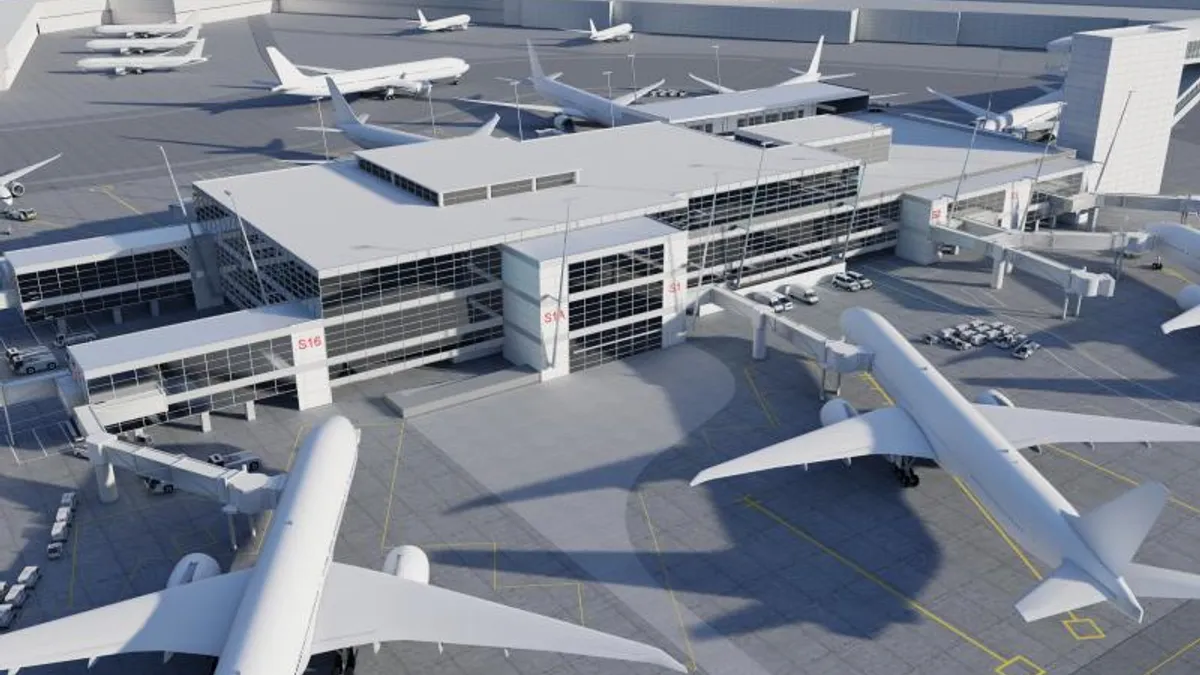Dive Brief:
- AECOM lost $134.7 million in the third quarter, compared to $101.9 million in profits a year ago, on $3.66 billion in revenue, a 13% increase year over year, according to its fiscal third-quarter earnings report released Monday.
- The Dallas-based global contractor’s backlog stood at $41.63 billion, driven by increased activity in its design business. That was up 1.2% YOY but down slightly from the firm’s record backlog of $41.9 billion last quarter.
- CEO Troy Rudd said on an earnings call Tuesday that the firm had felt the effects of inflation, but also saw steadier conditions ahead. “[Inflation] certainly has had an impact,” Rudd said. “The cost of actually delivering infrastructure projects has increased, but the other thing that we’ve started to see is those costs have begun to stabilize.”
Dive Insight:
On an adjusted basis, which allows firms to disregard one-time charges but doesn’t comply with generally accepted accounting principles, the firm said it had 10% organic growth and expanded margins. It narrowed its full-year, adjusted profit guidance for fiscal 2023 to a range of $950 million to $970 million from its previous estimate of $935 million to $975 million.
Inflation continues to impact project budgets and ambitions, according to Rudd, but it hasn’t hit the firm’s pipeline or backlog. “We don’t see it at this point really impacting the pipeline for the future,” Rudd said. “The pipeline is still growing at a faster rate than our backlog.”
The firm sees strength across nearly every major geographic market where it operates, and in the transportation, environmental remediation, energy transition and water sectors in particular, Rudd said.
More infrastructure opportunity ahead
Federal money is buoying markets in the U.S., Rudd said, and infrastructure continues to be a bright spot into the next several years. Activity in the U.S. is set to accelerate in fiscal year 2024, he said, due to federal dollars from the Infrastructure Investment and Jobs Act, Inflation Reduction Act and CHIPS Act.
“There is a lot of funding that has been put in place that exists to date that is just starting to get deployed here in the U.S. We’re actually starting to see the IIJA money come into the market for projects,” Rudd said. “I continue to see the deployment of IIJA funds accelerating next year, and … we see the deployment of those funds peaking maybe in ‘27 or ‘28.”
He cited the Brent Spence Bridge as one such IIJA-enabled project. AECOM will serve as the lead designer on the $3.6 billion span between Cincinnati and Covington, Kentucky.
In addition to the IIJA, IRA and CHIPS Act, the EPA’s new drinking water regulations are creating significant growth opportunities to remediate dangerous per- and polyfluoroalkyl substances, also known as PFAs or forever chemicals, Rudd said. PFAs do not easily break down and are difficult to remove through traditional water treatment methods.
Localities in the U.S. and beyond are also heavily investing in infrastructure to deal with too much or too little water, and he sees such resilience projects as a strong long-term opportunity.
Infrastructure growth is not limited to the United States — the firm is seeing positive funding indicators in all of its major markets around the world, with a few exceptions such as China, according to Rudd. AECOM is shrinking its business there.
However, in many of these areas, it’s taken a little longer for clients to bring their contracts to market than anticipated, and projects have taken longer to get started than expected. Still, Rudd said this hasn’t slowed the firm down.
In August AECOM was also selected to oversee design and engineering on the S Concourse Evolution at Seattle-Tacoma International Airport. The firm will also help rebuild Ukraine’s infrastructure, estimated to cost yearly half a trillion dollars, and manage delivery of the Chemours green hydrogen facility expansion in France.














